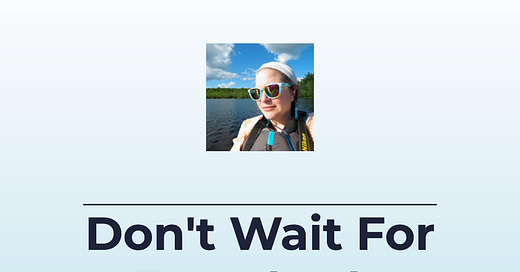Notes & Transcript: https://chloehumbert.substack.com/p/influencers-and-direct-marketing
Skepchick - Big Oil Bought my Favorite Science Influencer, by Rebecca Watson, January 26, 2023
The Weaponisation of Everything: A Field Guide to the New Way of War by Mark Galeotti - Feb 2023
Transcript:
I'm Chloe Humbert, and I'm not waiting for everybody. Influencers and Direct Marketing. Rebecca Watson had a video on how an influencer on TikTok, a science influencer, appears to be now promoting propane, which is a fossil fuel. Rebecca Watson: “But if you search for information on the damage caused by propane, you'll find pretty much nothing but press releases from the propane industry under different names bragging about how burning it isn't as bad as burning diesel. And that, I'm sad to say, is what Calandrelli’s video is. It's propaganda wholly funded by the Propane Education and Research Council, or PERC, a fossil fuel industry group that the New York Times recently exposed as an ethically and maybe legally shady operation that's currently spending millions of dollars to hire influencers on TikTok, YouTube, and even cable TV to sow misinformation about zero emission energy.” Chloe Humbert: In October of 2022, the U.S. Securities and Exchange Commission, the SEC, put out a press release. Quote, The Securities and Exchange Commission today announced charges against Kim Kardashian for touting on social media a crypto asset security offered and sold by Ethereum Max without disclosing the payment she received for the promotion. Kardashian agreed to settle the charges, pay 1.26 million in penalties, disgorgement and interest, and cooperate with the commission's ongoing investigation. The SEC's order finds that Kardashian failed to disclose that she was paid $250,000 to publish a post on her Instagram account about EMAX tokens, the crypto asset security being offered by Ethereum Max. Kardashian's post contained a link to the Ethereum Max website which provided instructions for potential investors to purchase EMAX tokens. This case is a reminder that when celebrities or influencers endorse investment opportunities including crypto asset securities, it doesn't mean that those investment products are right for all investors, said SEC Chair Gary Gensler. How this is important is that Kim Kardashian has quite a bit of money, fame. She has lawyers, I'm sure, all sorts of advisors, agents, whatever. And it's against the law to promote something without disclosing that you're receiving payment for it. And if she didn't disclose, I mean, she got caught. She was paid $250,000. Do you think that the government has enough money to go after every mid-level influencer for every $200 that they're receiving for promoting something and not disclosing that? Not saying your favorite influencers are doing that, but when an influencer of any level is promoting a product, it’s not unreasonable to question if they have financial motives for doing so. So it's not always as clear as an affiliate link. Affiliate links are, you know, pretty obvious and they happen a lot and unfortunately a lot of people don't know about affiliate links. At least that's obvious, they're not hiding it per se, but in some of these cases, people just take money and they promote stuff and they don't disclose. And some of the people in these gig work influencer economies, they might not even be aware of the law. Now, ignorance is not an excuse, but they might not even be aware that they are supposed to disclose that. Ask them, if you can. I would. before buying something that some influencer is saying, hey, this is something that works or this is great. In 2021, Matt Binder had a report on Mashable that was titled, 12 people are behind most of the anti-vaxxer disinformation you see on social media. The disinformation dozen are spreading anti-vaccination content throughout the internet. Quote, a new report from the Center for Countering Digital Hate and Anti-Vax Watch found that up to 65% of anti-vaccine content on Facebook and Twitter originated from 12 influencers within the anti-vaxxer movement. The report focused on these 12 accounts after an analysis of content that was shared and posted on Facebook and Twitter 812,000 times between February 1st and March 16th. On Facebook alone, the content from these individuals, which the report dubs as the disinformation dozen, accounts for 73% of all anti-vaxxer content posted or shared on the platform in the last two months. The largest anti-vaxxer influencer on social media, according to the report, is Joseph Mercola. Mercola is an alternative medicine promoter who runs a multi-million dollar online business selling treatments and dietary supplements. The FDA recently sent Mercola a warning over his sham treatments for COVID-19. Another major culprit is Robert F. Kennedy Jr. Kennedy, the nephew of John F. Kennedy, is perhaps one of the most high-profile influencers in the anti-vaxxer community. Unquote. A pal recently said to me, in our attention economy, where algorithms prioritize maximizing engagement, you have to constantly show your thing is the best, better than all the rest. Otherwise, you lose out on all the eyeballs. And so then you have a sort of fanaticism that's encouraged, overwhelm any opposition on social media and forums to hammer the points with a gish gallop or a dog pile. And this is a PR tactic. A Business Insider report from July of 2022. The headline says Facebook groups with thousands of members are organizing armies of fake product reviewers. Amazon says in lawsuit, quote, Amazon is suing more than 11,000 people who say they run Facebook groups that broker fake product reviews. The lawsuit says that Facebook group members would get paid cash or in free product to write five star reviews. The groups misspell or change certain phrases to avoid getting suspended by Facebook, the suit alleges, unquote. So these operations of direct marketing are going on all the time. Part of the attraction to the influencer industry is that there's this promise that maybe you can make a lot of money and of course there's a lot of money behind anti-vax so if you know the right things to say you can get boosted by those sources and maybe offered money to promote certain things. The Tech Won't Save Us podcast recently had an episode about the influencer industry and it was titled, The Influencer Industry is Built on Precarity. Emily Hund: “There is this sort of endless potential of like, I'm a creator, you're a creator, tomorrow I could have this enormous audience and my whole life will change. And so I better, you know, invest some amount of time and energy into creating content for these platforms because you never know. And again, that really speaks to how these sort of fundamental structural pieces that made the industry possible, you know, 15 plus years ago, have not really changed that much. The world has obviously changed tremendously, technology has changed, a lot has changed, but the sort of basic principles of economic uncertainty, a sense of professional precarity, a sense of uncertainty about the future and the sort of pressure to rely on yourself and figure out how to survive on your own. And also the sense of social distrust, sense of sort of powerlessness or resignation to the sort of Monopolistic billionaires that are seemingly taking over more and more like functions of our lives. These sort of fundamental negatively tinged feelings of uncertainty really haven’t changed. And so that I think keeps the appeal of becoming a successful content creator, influencer, it keeps going. And it continues to sort of lock people into this sort of loop of, I have to find ways to create a safety net for myself. So like, maybe I should start posting on TikTok, you know, even though I'm a vet, or something like that. Like, even though I am a school teacher, or something like, I should start making content on TikTok, because you never know. And so that sort of fundamental uncertainty and the economic reality that many people, even super educated professionals, are living paycheck to paycheck in many cases. And so that kind of keeps gas in the tank of this industry.” Paris Marx: “Yeah, and you can very clearly see how so many of these platforms do depend on kind of constantly having people who are making content for them who maybe don't expect to take off or maybe are doing so in the hopes that they are going to kind of replicate the pathways of one of the influencers or creators that they follow and will kind of join those ranks. But obviously, you know, there are way more people trying to do that than there are people who ever kind of succeed and have it become their incomes. Chloe Humbert: There's a book by Mark Galeotti called The Weaponization of Everything, A Field Guide to the New Way of War. And in it, he talks about how this whole ecosystem works. Here's an excerpt from the audio book that I listened to. Mark Galeotti: “Outsourcing goes beyond direct warfare and into non-kinetic contests. This century has also seen the explosion of the gig economy. Individual freelancers and temporary workers, sometimes recruited directly, sometimes through online platforms or third-party matchmakers. It may seem ridiculous to draw comparisons with the cycle courier who brings you your pizza. But this is less fanciful than might appear in an age when conflicts may be fought through the medium of carefully curated newspaper articles highlighting a grievance or attacking a government. And when online influencers can pivot from hyping a hair product to pushing a political cause. Chloe Humbert: “This way that influencers pivot, because they have to, to make money, at times, in this gig economy. This is why it’s very problematic to rely on influencers, or you know think that this is going to help, or save us, or be the answer to activism, or anything like that. And I’ve watched, this is one of the key points they tell you in recognizing bots and troll farm accounts is over time, you can see how their positions completely change. Sometimes they will start out on the left and then suddenly be right wing. Well, these accounts, as I have mentioned before, get bought and sold, and that is a thing. And sadly, you know, even just people in this market of doing influencer and advertising their content production, that happens too. They go where the money is. And this is why I find it most important to spend my time writing my political elected representatives and making it clear to them that I'm a real person, I'm a constituent, I live in their district, I live in their state. This is what is important to me. And write your reps. Influencers are not going to save us. They can get word out about something, but then it could be, you know, the truth with a lie chaser. Today they're promoting what you think is good, and then tomorrow they might take money to promote something else that you don't agree with. So the bottom line is, write your reps.












Share this post